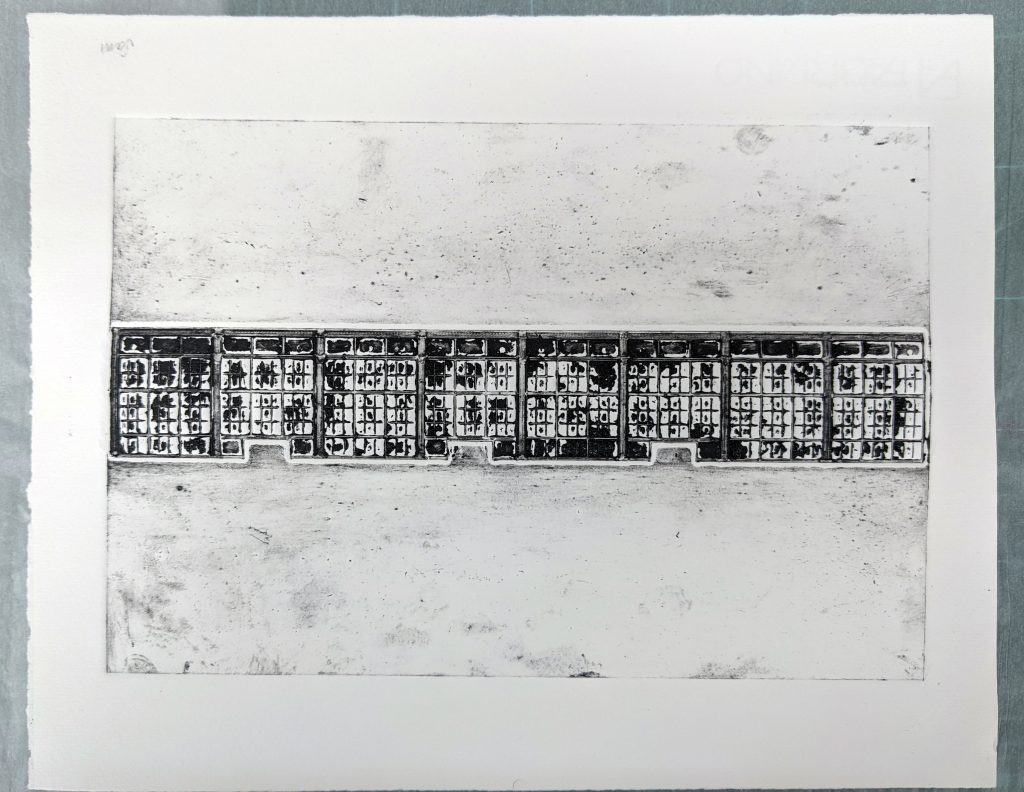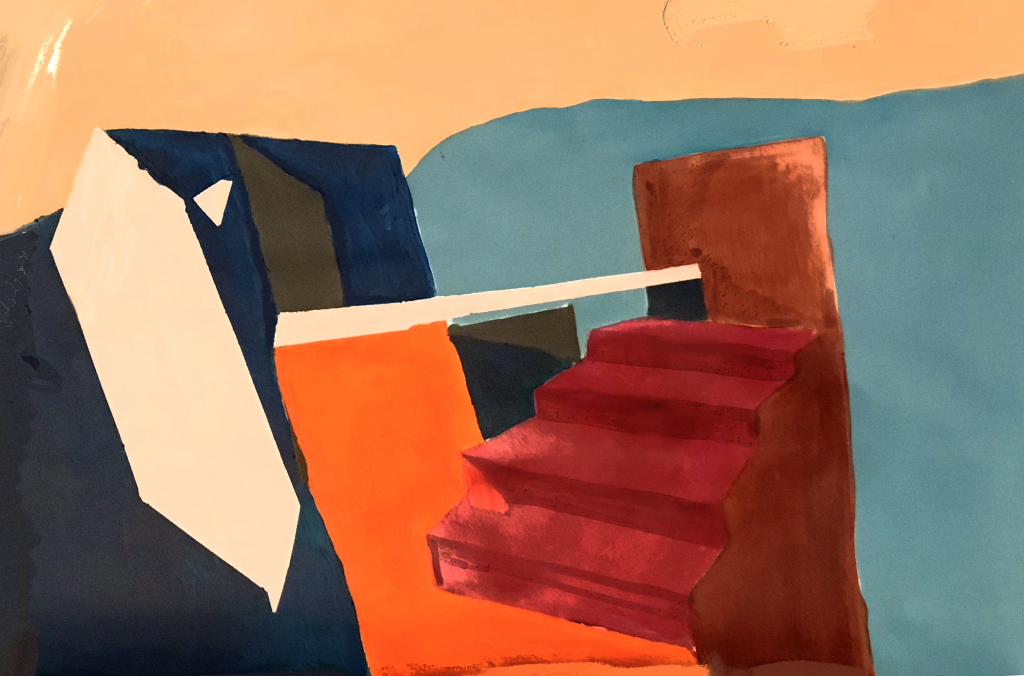JL: Rather than write a simple critique, I am trying to do 2 things. First, I am trying to provide better access to the story for English speakers, whose French is but modest by providing an English translation. Second, I am trying to elicit further information from the possible author/subject of the story, with respect to the relationship between her early experiences and her present thinking and behaviour, as concerns her childhood and her current engagement with the world. Here goes. On va voir ce que ca donne……

Translation
Glandue. This word, I heard it very often during my childhood. Designating a foolish, silly, witless person, this term was for my father an abbreviation of the word “glandeuse” and, in his eyes, applied perfectly to me. [1]
My father, a country doctor, a great insomniac in front of the Eternal and an obstinate gardener during his days of ‘rest’, still likes to repeat this sentence today: “It would take me several lifetimes to have time to do everything I would like to do ”. This motto has long inspired me with a mixture of admiration and bewilderment, but above all a lot of guilt. [2]
Why, me, I never felt like I ran out of time? Why didn’t the urgent need to act tickle my brain as soon as I had a free minute? My dad, who was awake between 4 and 6 a.m. every day of the year, was already outside in a bathrobe feeding the rabbits when the rest of the family started to wake up. Sleeping after 8 a.m., even on non-school days, was considered a claimed act of cheeky laziness. More than any other time of the week, I feared DIY weekends in the garden.
For my father, it was simple: his free time, and by extension ours, had to be devoted to useful, productive and preferably manual activities. Repair the henhouse, store hay, dig the garden; these activities, which are the dream of today’s thirtysomethings in need of a rural life, were the only noble occupations to which it was well seen to devote our weekends. I quickly understood that there is no universal definition of free time: everyone has their own conception of it, in accordance with their grid of values - and for a child, the choice of hobbies is unfortunately subject to the cruel parental yoke.
Reading, my favorite hobby since the age of 7, was obviously not a priority : static position, no sweat, and no return on investment. Yet I was far from being an acorn when it came to devouring books: in the evening until midnight, a flashlight under the duvet, a book hidden on my knees during meals, my endurance was flawless.
At the same time, I worked out more or less skilful maneuvers in order to escape various requests concerning shutters to be painted or lawns to be mowed. My father, who also appreciates reading in his rare spare time, often quotes the conclusion of Voltaire’s Candide to illustrate his philosophy : “We must cultivate our garden”. Coming from him, this phrase sounded like an injunction to action, especially when you look at the full sentence in the original text: “when man was put into the garden of Eden , he was put there […] to work, which proves that man was not born to rest. [3] “
In Roman times, the concept of free time was a true art of living called otium. Translated by the words “retirement”, “peace”, “tranquility” [4], otium was a time of detachment from public life dedicated to rest and to activities beneficial to one’s mind, such as reading, philosophy, art practices or contemplative strolls. Man, as Seneca said, like any fertile land, needs periods of fallow to recharge his batteries.
In our busy society, oscillating between work and endless entertainment, it can seem blasphemous to devote one’s free time to introspective or selfless activities. We must optimise our long awaited days of freedom after a week of hard work. If the sacredness of work has faded since the days of our parents and grandparents, it is important to be efficient, even in our leisure time.
Besides, how could we choose to do nothing when considering the infinite possibilities available to us? If reading remains a tolerable pastime, it is insignificant in comparison to sport, travel, festive and cultural outings and so-called “personal development” activities which, in contradiction with their very nature, are subject to a strong injunction.
Our digital tools and their flock of “apps” take car of what remains of our time, making the most of every available second with a game, a video, a podcast or a scroll on social networks. The passive contemplation of time does not seem to be an option. Delighted as we are to share our most solitary occupations and to keep ourselves informed of the world’s events at all times, are we still able to temporarily withdraw from active life?
In Latin, otium is – in the linguistic sense and in the literal sense – the negation of the negotium, the world of work and of public and productive affairs. Today, the values of negotium are introduced into free time and fills our spare time with aims to achieve and information to swallowed. As if to confirm this shift, the word otium has turns into “idleness” [oisiveté] in French: through the prism of our values, the “worthy leisure” of the Romans is reduced to a demonstration of complacent laziness, a very nasty flaw.
As if touched by self-fulfilling prophecy, I went through several periods of unemployment. After being called “glandue” for years, I was now idle in the truest sense of the word: unoccupied. Even before I had the time to determine how much this situation weighed on me, my friends and family bombarded me with questions about my way of dealing with boredom, and suggested all kinds of activities: getting involved in an association, take yoga classes, swim, meditate, draw, travel. These recommendation usually ended with the same sentence, uttered in a dreamy tone “there is so much I would do if I had as much time as you”.
These tips, although paved with good intentions, only increased my discomfort : not only did I not work, but also I did not “make the most” of my free time. Make the most of time, even when time isn’t money. Did I really want to make my available time a to-do list ?
Devoid of deadlines and planned activities, we quickly realize that time stretches and shrinks as it pleases, until it sneaks out of our shackles. Can we still talk about “free time” when there is no constrained time anymore? Why not go so far as to do nothing when time does not seem to have a hold on us ?
Today, locked into my apartment, I go round in circles with shameful satisfaction. The President of the Republic himself solemnly recommended to indulge in reading. Right now, the world no longer belongs to anyone, not even to those who get up early. Insomnia, so distressing in normal times, has turned into pleasant moments of solitude. I discovered that they allow, among other things, to listen to blackbirds singing in the early morning. The days of the week have lost their name and go by with the pleasant passivity of a Hopper painting.
For those (like me) who can no longer work, time has become free time. Not free to go out, but free from work starting again every Monday, free from the guilt of being the only one doing nothing, free not to organise one’s day. If it causes anxiety for some, it seems to be a relief for many who, even before the pandemic, liked to keep warm and live slowly. Careful not to say it out loud, many of them secretly hope that this interlude outside of time will last a little longer.
This free time, although constrained, suggests the possibility of a brief return of the Roman otium : a retreat from the world, giving space to introspective activities. The opportunity to cultivate our vegetable garden, but also other gardens, in all the figurative senses that one wants to give them. Would we even dare to fallow and grant a well-deserved rest to bodies and minds?
Though some of us persist in wanting to make this abundance of time profitable, we can still hope that idleness will be (even for a brief moment) given back its respectability.
My father, who has been suffering from Parkinson’s disease for a few years, slowed down long before locked down. Ironically, the symptoms started to reveal themselves when he retired, as he was finally about to dedicate himself to his many productive hobbies.
Tying his shoelaces, buttoning his shirt, writing…everything now takes time, a lot of time, and considerable effort. The simplest actions have become activities in their own right. For the first time, I see my father forced to slow down. I see him reading, sitting down and resting for more than ten minutes a day, sometimes staring into space and short of breath.
It seems that he even takes the time to stroke his rabbits. For the first time, I gladly accompany him to the garden, and I collect potatoes and plant pear trees. And for the first time, our two notions of time seem to have found common ground.
As the apple never falls far from the tree, I now have my own vegetable garden. And I feel like I am finally beginning to understand my father’s philosophy. Cultivating one’s garden is not just about stirring up the earth with the sweat of your brow; it also means being patient, and taking the time to look around while what you sown is slowly growing.
[1] JL: Maybe an alternative translation would be ‘dawdler, shirker, loafer’. The two translations differ in tone and in meaning. The latter allows for the designated person to be doing so with good reason. The former not so. If referring to myself, when I was younger, I might have accepted the latter, but certainly not the former.
Question: Do you think that either of the two (or indeed of any other) possible meanings apply to you now? If so and indeed, if not, how come?
[2] JL: Your father sounds like a busy bee, always on-the-go and never having enough time to do all that he wants. You say it affected you – a mixture of ‘admiration, bewilderment and guilt’. Of course, we are all affected by our upbringing (a la Freud or by any other someone) and by the world that we are born into (a la Marx or by any other someone). Life is the tension that being for itself (the intentional self) has to resolve between what one is and what one wants to do.
Question: How do the ‘admiration, bewilderment and guilt affect your current thinking and behaviour, as they reflect your upbringing and engagement with the world?
[3] Voltaire, Candide ou l’Optimisme, p.127, ch.30, édition abrégée des Nouveaux Classiques Larousse, 1968.
[4] https://www.grand-dictionnaire-latin.com/dictionnaire-latin-francais.php?parola=otium.
Commentary
Comment

OceanWP Settings
Move upMove downToggle panel: OceanWP Settings
Content LayoutSelect your custom layout. Default Right Sidebar Left Sidebar Full Width 100% Full Width Both Sidebars DefaultSidebarSelect your custom sidebar. Default Default Sidebar Left Sidebar Search Results Sidebar Footer 1 Footer 2 Footer 3 Footer 4 DefaultMarginsEnable or disable the margin top and bottom.
- Enable
- Disable
Image Gallery
Move upMove downToggle panel: Image GalleryOpen document settingsOpen publish panel
- Document